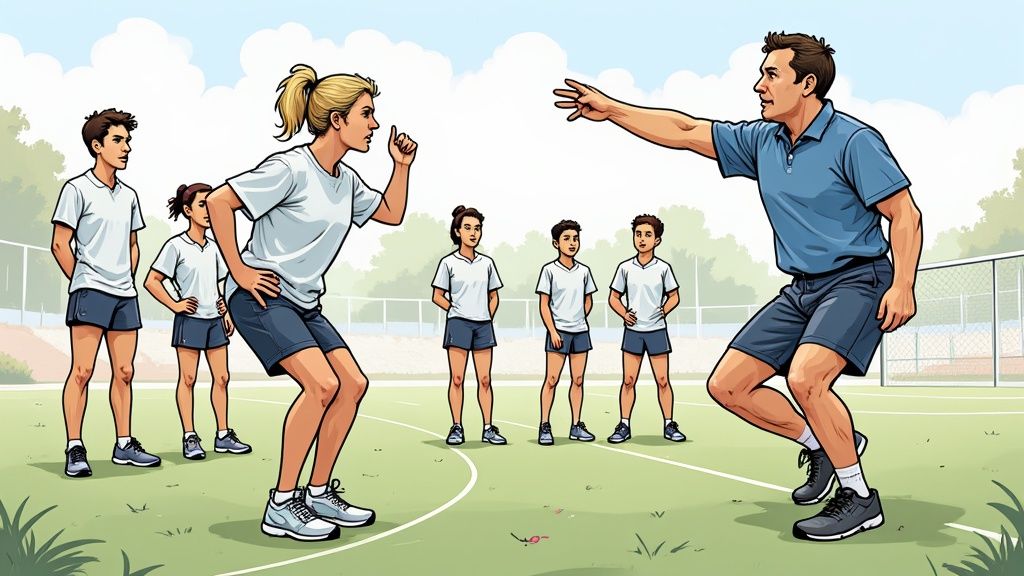What Makes a Good Coach: Essential Traits and Proven Strategies for Coaching Success


to human style:
Understanding the Impact of Effective Coaching

What makes a good coah? The answr goes beyound just sharing knowlege - it's about creating real change. Great coachs help their clients develp new skills, improve performnce, and achive meaningful goals. The best coachs build strong relatnships that inspre growth and developmnt.
Measuring Coaching Effectiveness
To understand if coaching is working, we need clear ways to measure success. Here are key indicators that show coaching is making an impact:
Better Performance: Clear progress toward defined goals
Self-Awareness: Understanding strengths, weaknesses, and mindset blocks
Smart Decisions: Making well-thought-out choices aligned with goals
Mental Toughness: Handling setbacks and challenges effectively
Getting regular feedback from clients also helps coaches refine their approach. A recent study by the Institute for Employment Studies found that 89% of people felt their coaching was effective. The research, covering nearly 300 professionals across 34 countries, highlighted that the coach-client relationship strongly influences results. When that connection is weak, coaching becomes much less impactful.
The Wider Impact of Quality Coaching
Good coaching creates positive ripples far beyond individual clients. In teams, effective coaching builds stronger communication, teamwork, and shared purpose. This leads to better overall results and organizational success.
The benefits spread even further into families and communities. When people grow through coaching, they become better leaders, co-workers, and contributors to society. A skilled coach doesn't just help one person - they start a chain reaction of positive change that impacts many others. This lasting influence on multiple levels is the true mark of excellent coaching.
Essential Qualities of Outstanding Coaches

What sets exceptional coaches apart from good ones? While expertise and measurement are important, the personal qualities of coaches make the real difference. The most effective coaches go beyond knowledge to develop core traits that create lasting client success.
The Power of Emotional Intelligence
Emotional intelligence (EQ) is what distinguishes great coaches. This means understanding your own emotions while reading and responding to others' feelings effectively. For example, coaches with strong EQ can handle difficult conversations smoothly, connect with clients quickly, and create an environment where people feel safe being vulnerable. This builds the trust needed for real progress.
Adaptability and Personal Focus
Top coaches know that each client needs a unique approach. They adjust their methods based on individual personalities, learning styles, and what motivates each person. Like a skilled chef who modifies recipes for different dietary needs, great coaches customize their style to fit each client's specific situation.
Expertise Meets Understanding
Successful coaches balance technical knowledge with genuine care for their clients. While clients need to trust their coach's expertise, skills alone aren't enough. The best coaches blend their experience with real understanding of their clients' challenges. This combination creates meaningful results.
Building Trust and Clear Boundaries
Trust forms the foundation of effective coaching relationships. Coaches build this through careful listening, honest communication, and maintaining professional limits. They create safe spaces for clients to explore challenges openly while keeping appropriate boundaries. This framework helps coaches guide clients effectively and ethically.
The Art of Powerful Questions
The best coaches excel at asking thought-provoking questions. Rather than giving direct answers, they help clients discover solutions themselves. These questions spark self-reflection, reveal hidden barriers, and encourage clients to take charge of their growth. This approach leads to deeper insights and lasting positive changes. When combined with ongoing learning, these essential qualities make coaches truly outstanding.
The Role of Professional Development and Qualifications
Professional development is a key element of being an effective coach. Through ongoing learning and growth, coaches can improve their abilities, keep up with new developments, and provide better support to their clients. This commitment shows dedication to excellence and helps build a strong foundation of knowledge.
The Importance of Continuous Learning
The coaching field constantly grows with new research and methods. To stay effective, coaches need to embrace ongoing education through workshops, certifications, and professional communities. This helps them offer the most current and helpful coaching practices to their clients.
Certifications and Credentials: Do They Matter?
The value of formal qualifications depends on the coaching specialty. While some areas require specific certifications, others focus more on proven experience and results. Getting relevant credentials can boost credibility and show commitment to professional standards.
Maximizing the Return on Educational Investments
Smart coaches choose professional development that matches their specialty and goals. For example, a leadership coach might focus on executive coaching certifications and organizational psychology training. This focused approach helps coaches build specialized expertise that makes them stand out.
Balancing Formal Education and Practical Experience
While credentials provide a foundation, hands-on experience is vital for developing coaching skills. Many successful coaches combine formal training with real practice, mentoring, and peer feedback. This helps them apply their knowledge in actual coaching situations. Recent data shows that 3.1 million adults in the UK coached last year, but over half lacked formal qualifications, especially in community and outdoor settings. Research found that qualified coaches reported more confidence in their coaching. Learn more in the UK Coaching National Population Survey Report.
Creating a Personalized Professional Development Plan
A good professional development plan should match a coach's needs and goals. It should include both short and long-term objectives, relevant training opportunities, and ways to track progress. By actively managing their growth, coaches can keep improving their practice and find satisfaction in their work.
Building Effective Coaching Programs and Methodologies

Successful coaches understand that a well-designed program forms the foundation for client growth. A thoughtful coaching program combines clear planning, practical implementation, and regular evaluation to match both coach expertise and client goals.
Key Components of a Successful Coaching Program
Top coaching programs share several essential elements that drive results:
Clear Objectives: Start with SMART goals (Specific, Measurable, Achievable, Relevant, Time-bound) to create a focused path forward
Personal Approach: Consider each client's unique background, learning style, and motivations when designing the program
Structured Modules: Organize content into clear segments that build skills progressively
Practical Tools: Give clients specific techniques they can use right away in their daily lives
Regular Check-ins: Build in consistent feedback and evaluation to track progress and adjust as needed
Developing a Flexible Yet Structured Methodology
The best coaching approaches find the right balance between structure and adaptability. Using a core framework while staying open to adjustments helps coaches tackle unexpected challenges and take advantage of new opportunities that arise.
Goal Setting and Progress Tracking
Setting meaningful goals collaboratively with clients is crucial for program success. Regular tracking through journals, check-ins, and relevant metrics helps maintain motivation and spot potential issues early. For example, sports coaches may monitor physical performance stats and game strategy execution. According to research on the National Soccer Coaches Association of America's National Diploma Program, coaches who completed the program showed significant improvements in key areas like motivation, technical instruction, character building, and game strategy. Learn more about the research here. Consistent evaluation ensures the program evolves with client needs and delivers meaningful results.
Developing Strong Coach-Client Relationships

The foundation of successful coaching lies in creating meaningful connections with clients. When coaches build authentic relationships, they create an environment where real growth and development can happen. Let's explore the key elements that help coaches establish and maintain productive partnerships with their clients.
Building Rapport and Trust
The journey begins with establishing rapport - a genuine connection based on understanding and empathy. Coaches use active listening to fully grasp their client's perspective and create alignment. Simple techniques like mirroring body language and reflecting key messages help strengthen this connection. Building trust is essential, as clients need to feel safe sharing their challenges and aspirations openly. Without trust, clients may hold back important information that could help drive their progress.
Establishing Clear Agreements and Expectations
A clear coaching agreement sets the stage for success by defining how coach and client will work together. This includes practical details like meeting schedule and duration, as well as broader goals for the engagement. Both parties should discuss potential obstacles upfront and agree on how to handle them. When expectations are crystal clear from the start, coach and client can focus their energy on achieving meaningful results rather than managing misunderstandings.
Maintaining Momentum and Accountability
Success requires sustained effort over time. Good coaches help clients set achievable goals, break them into smaller steps, and celebrate wins along the way. Regular check-ins keep clients focused and motivated to continue making progress. Creating accountability structures empowers clients to take ownership of their development. For instance, coaches often work with clients to create weekly action plans and review progress in follow-up sessions. This ongoing support helps clients stay committed when facing inevitable challenges.
Navigating Challenges and Maintaining Professional Boundaries
Every coaching relationship faces obstacles at times. Skilled coaches address difficulties directly while maintaining professionalism and empathy. This may involve having candid conversations about conflicts, helping clients reframe limiting beliefs, or adjusting coaching approaches as needed. Throughout the process, maintaining appropriate boundaries is crucial. This includes protecting client confidentiality, avoiding conflicts of interest, and following ethical guidelines. Clear boundaries create the safety and structure clients need to grow and achieve their goals.
Measuring and Evaluating Coaching Success
Understanding coaching impact requires looking beyond just completed sessions. A mix of data-driven analysis and meaningful client feedback helps paint the full picture of a coach's effectiveness. Success comes from helping clients achieve real, measurable progress.
Defining Success: Quantitative and Qualitative Measures
Good coaching delivers concrete results. You can track these through hard numbers like improved performance ratings, higher sales figures, and achievement of specific client goals. For example, a sales team working with a coach might see a 20% boost in conversions. When a client lands their target promotion within the planned timeframe, that's a clear win.
But numbers only tell part of the story. Client feedback, self-assessments, and direct observations reveal the human side of coaching impact. These insights highlight vital improvements in areas like communication ability, self-understanding, and decision-making skills. Together, the hard metrics and personal growth indicators create a complete view of coaching effectiveness.
Tools and Frameworks for Tracking Progress
Several practical tools help monitor coaching progress. Basic spreadsheets work well for goal tracking and key metrics. Professional coaching platforms provide robust features for client management, scheduling, and feedback collection. The GROW model (Goal, Reality, Options, Will) offers a proven structure for sessions while measuring progress. This systematic approach keeps coach and client aligned on shared objectives.
Demonstrating Value and ROI
Showing clear return on investment matters, especially in business settings. Coaches need to connect their work to concrete business outcomes. This means tracking improvements in employee engagement, productivity metrics, and overall performance. Being able to demonstrate these results helps justify coaching investments and builds support for coaching programs within organizations.
Continuous Improvement Through Evaluation
Evaluating coaching success is an ongoing journey. Regular data review, feedback collection, and practice reflection help coaches keep improving their methods. The best coaches embrace this continuous learning mindset and actively seek ways to enhance their effectiveness. This commitment to growth and development sets exceptional coaches apart. The coaching field keeps evolving, so staying current through evaluation and adjustment is essential.
Ready to take your coaching practice to the next level? Coaching Hub provides resources, expert guidance, and a supportive community to help you succeed. Visit us today to discover tools and strategies that will transform your coaching impact.